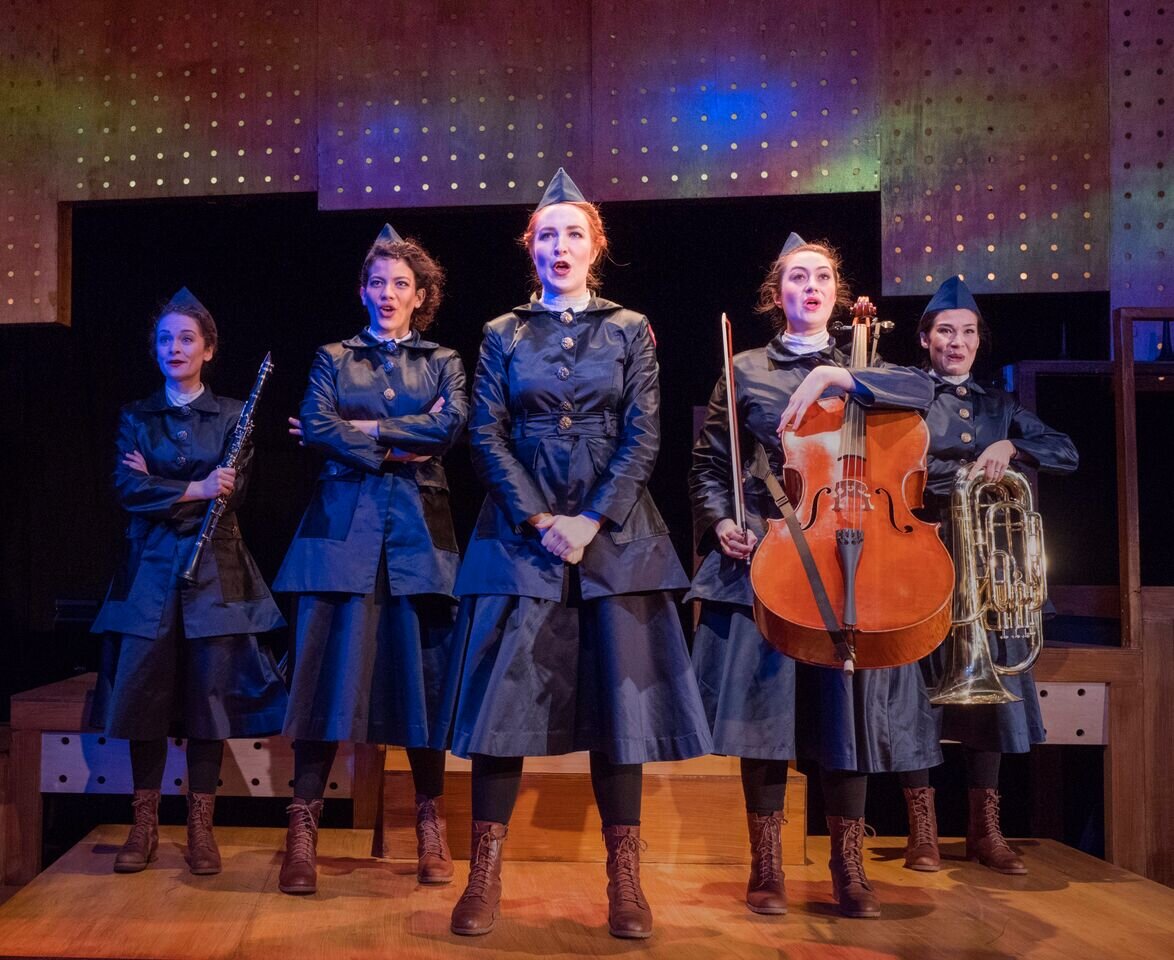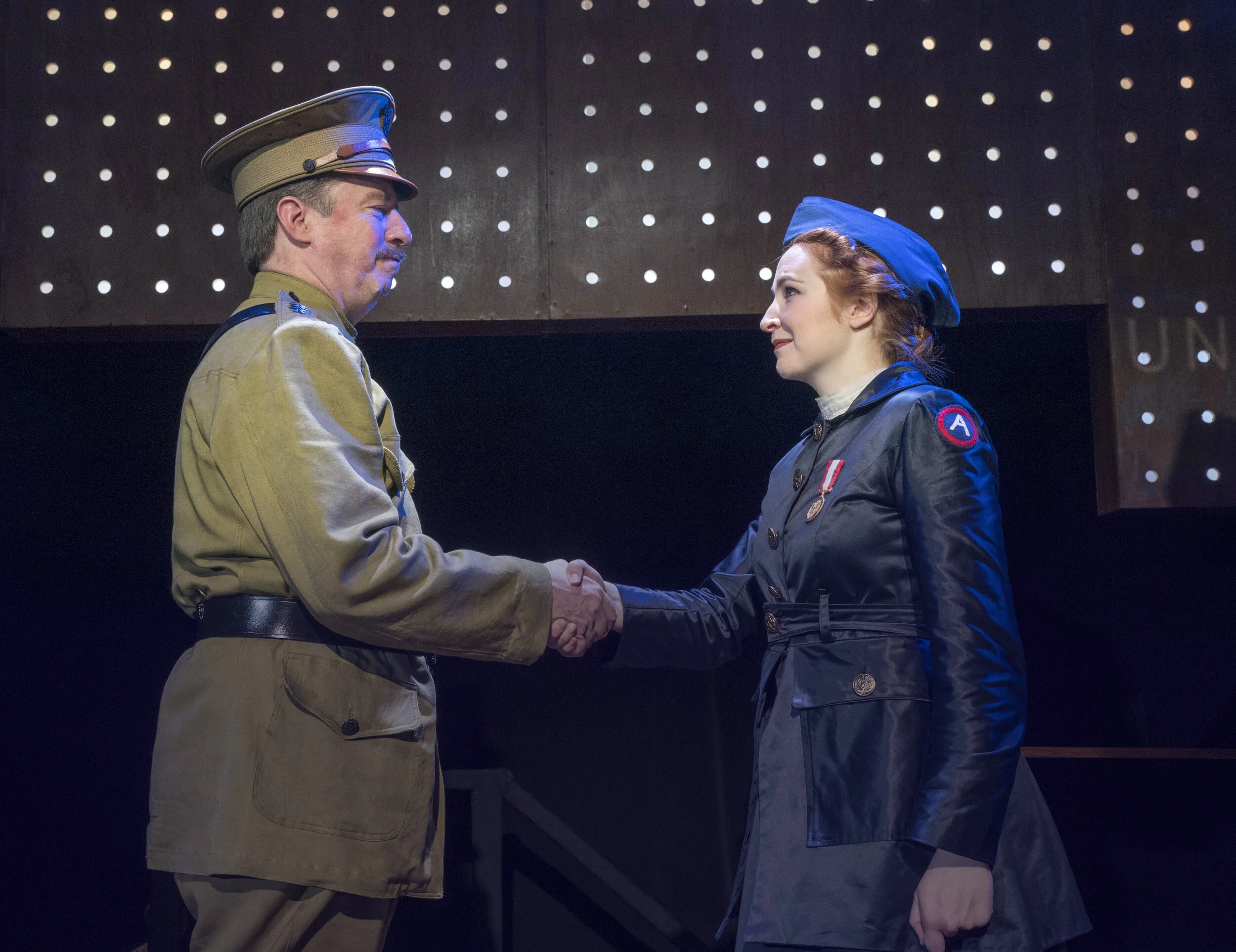Finally Centerstage and Singing: ‘The Hello Girls’ at 59E59 Theaters
It was the phrase “unsung heroes” that captured Cara Reichel’s attention. The hour-long PBS documentary spotlighting women in the military only devoted about two minutes to the Hello Girls, the female phone operator working as telephone operators during World War I. But the story resonated with Reichel, and the founding artistic director of Prospect Theater Company got to work.
The women are now the titular subject of a new musical chronicling the very first group sent overseas. Running two and a half hours, with 19 songs, the wildly entertaining world-premiere production ensures these women can no longer be described as “unsung.”
Reichel wasn’t the only one drawn into the story of America’s first female soldiers. A book, by Elizabeth Cobb, and a documentary aired on PBS in March, both titled “The Hello Girls,” detailed the events of the history-making women.
And now the musical of the same name, with music and lyrics by Peter Mills and a book by Mills and Reichel, is playing at New York’s 59E59 Theaters through December 22.Reichel directs the 10-person cast which doubles as an onstage band playing a score encompassing various genres as it chronicles the events of the war. Period appropriate numbers jauntily evoke the stylings of the Andrews Sisters alongside waltzes, ragtime and 1920s swing. (“My rationale there was, ‘These women were ahead of their time. They were the proto-flappers,’” said Mills.)
Simultaneously lighthearted and informative, Reichel and Mills’ book fuses facts of the war with the women’s emotional journeys as they respond to the government’s call for recruitment. (Women were faster and better at the job than men). Avoiding the “Schoolhouse Rock” aspect of it was important to the writers, who said, “We wanted to walk a line. There is a lot of information that’s there, but really what plays in front of the audience is the emotion. You don’t want to lose sight of that while giving them all these dates and information.”
The Hello Girls highlights the many hypocrisies of the time, especially the women’s desire to serve at the military front and the commanders’ refusal to assign them due to the physical or mental strain it would impose. This frustrated desire for equal treatment is repeatedly communicated throughout the show. It’s only when one woman is threatened with a court-martial that she declares, “Good, then I’ll know I’m being treated like a man.”
“We needed to find a way to anchor it to contemporary relevance, but then to also let theater do what it does, which is not to preach but to tell a story — what these women felt, what we imagine these women might have been going through,” Reichel said.
While writing, Mills and Reichel referenced several primary sources, including the women’s diaries and the original applications at the AT&T archives in New Jersey. Reading through the requirements the women met in 1918 inspired reactions of incredulous disbelief.
Those emotions may have affected their writing, they said, and the musical’s feminist message is apparent in the Girls’ incensed refrain of, “We aren’t in the army yet,” while they go through the strenuous application process — one that was much more demanding than that asked of male soldiers. The women are seen repeatedly proving their worth, even dropping to the floor, unprompted, to give 20 push-ups — something they were not required to as they were assumed to be physically incapable.
This progressive point of view isn’t surprising, given the creative team of The Hello Girls is largely female) and it was created by female-led theater company — all noteworthy characteristics in the male-driven theater industry, and during a season where numerous musicals featuring female protagonists have been crafted by creative teams comprised largely of men. (A few titles include Pretty Woman, King Kong and the upcoming revival of Kiss Me Kate, among others.)
The Hello Girls opens 100 years following the women’s enlistment, but it’s noticeable what hasn’t changed, something Reichel and Mills didn’t shy away from addressing. Instead, they highlight those parallels to further enhance the musical’s relevance to a deeply divided nation struggling to reconcile political differences and shifting gender roles.“
I think when you’re making theater, you’re always asking, ‘Why tell this story now?’ Reichel said. “For all of us, there’s a very palpable reason and a lot of relevancy. We didn’t want that to be too heavy-handed, but we wanted to be clear about it.”No extra weight was needed when highlighting the Hello Girls’ treatment after the war ended. Simply stating the fact the Department of War denied them veteran’s benefits, including military funerals and medical care, is enough. The women were considered civilian contract employees — even though they were required to swear the Oath of Enlistment to “support and defend the Constitution of the United States against all Enemies, Foreign and Domestic” twice before traveling overseas.
It wasn’t until 1977 that the 223 Hello Girls were recognized as army veterans. Only 33 lived to see the day.
Engaging and educational, one wishes The Hello Girls would play for a longer time on a bigger stage — perhaps one on Broadway. But the number of works about women, by women, opening on Broadway are continuously low, and gender parity has consistently fared better in smaller theaters Off-Broadway. Reichel, who founded Prospect Theater Company in 1998, remarked that Hello Girls’ success during the war demonstrated the same need in the theater industry.
“It is a risk,” she said of inviting new artists to collaborate. “You have to go outside of your comfort zone. You have to be willing to put a woman in charge of a $20 million budget on a Broadway show and know they are equally as competent as someone else. There’s a lot of research to back this up in terms of women leading institutions. There’s this perception from that management point of view women aren’t as respected taking the lead. I think one of the big takeaways from this story is yes, eventually change does happen, but it sure doesn’t happen as fast as anyone wants it to.”



